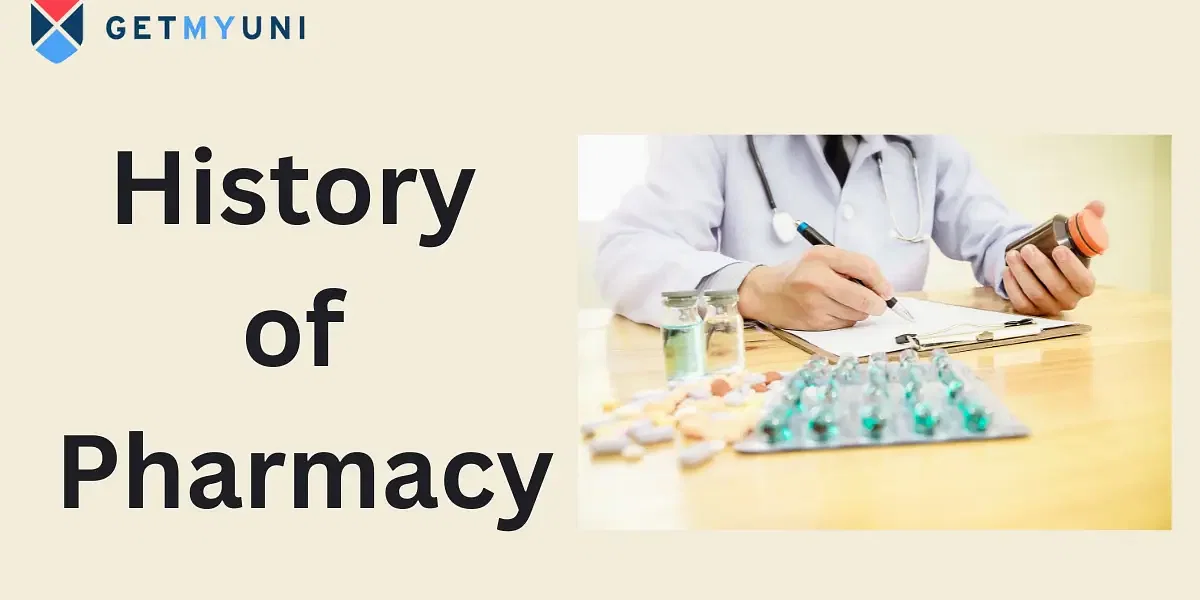Diseases have haunted mankind since forever, and the need to find cures has always been challenging. From using mud to chemicals, the history of pharmacy has been fascinating.
Table of Contents
History of Pharmacy involves medical science and chemistry and it functions to discover, produce, dispose of, safe and effective use, and control medications and drugs.
The birth and the history of the pharmacy began when the early humans realized that the extracts of the leaves have medicinal value. From that day, humans started trying various plants on several injuries and diseases based on previous observations. It kept on continuing till the late 18th century.
In the late 18th century, people started experimenting with chemicals, which revolutionized pharmaceuticals. Scientists observed that some chemicals reacted differently at different temperatures.
What Is the History of Pharmacy?
Many medical experts did experiments with various chemicals intending to treat human health. It was also the time when there were widespread diseases without any medicines to cure them.
- Once people started mixing chemicals and herbal medicines, they started achieving better results. It was in the 19th century that bacteria was discovered, and microscopes started coming up.
- A lot of researchers also understand the fact that a lot of diseases are caused because of bacteria. So, the researchers felt that to cure bacterial diseases, we have to study the bacteria to know how they function and their prevention.
- This was a huge shift in pharmacy; earlier, people were trying medicine on a trial-and-error basis, which is considered inhumane today.
- After people started to study the diseases and the bacteria causing them, the trial-and-error methods started fading away. Researchers today have discovered medications for almost all bacterial diseases.
- But in history, there were many instances where people would die from cold and fever due to a lack of proper treatment and health care facilities. So sciences took over the responsibility of treating people with proper methods and application procedures of pharmaceuticals.
What Were the Revolutionary Discoveries in Pharmacy?
Earlier, people did not know the dosages that one had to take to avoid other side effects of the medicine. Today, we are aware of the medicine's functioning in the human body, specific to the age and medical history of the patient.
One of the best-known antibiotics in the history of humankind is known as Penicillin, discovered by Sir Alexander Fleming in 1928. It is not a myth that more than 75% of today's population must thank Penicillin.
Without it, most of our parents and grandparents would get infections, and the population would have never reached the numbers it is today. Penicillin is an antibiotic that cures humans of a wide range of diseases. This was the pharmacy's single answer to many questions and cures.
The pharmacy also deals with various synthetic chemicals that can be used as painkillers and disease-curing drugs. These drugs are manufactured using various chemicals, mixing them with herbal extracts.
These combinations are done based on individual chemical behaviours in humans. Until now, we have exclusively discussed the history of pharmacy in the entire world. Let us now look into the history of pharmacy in India.
Read More: How to Become a Pharmacist?
What Is the History of Pharmacy in India?
Pharmacy in India also goes back to a very ancient past. The subject of Ayurveda and Yoga is considered to be very important in Indian pharmaceutical studies. The roots of Ayurveda and Yoga can be traced back to more than 5000 years ago.
The knowledge is a combined and collective knowledge of various sages and monks who used herbal juices to heal various diseases and injuries. It has to be noted that in Indian culture, there is no difference between a pharmacist and a doctor.
Therefore, it gave a solid base for all the ancient doctors in our country to try medicines they felt would suit the patient's body better.
India is also a country where a majority of the people follow vegetarianism. If we look back into the reasons for this vegetarianism, we will realize that it was done to avoid diseases from the animals.
Indians far back in the past observed that the root cause for most diseases is viruses caused by the contact of dead animals. So people in India started practising vegetarianism, avoiding dead meat. Today, people appreciate this practice all across the world as this gives us immunity to certain diseases from birth.
Read More: B.Pharma Entrance Exam 2026
Who Is Known as the Father of Pharmacy in India?
The father of Pharmacy in India, Mahadeva Lal Schroff, was born on 6th March 1902 at Darbhanga in Bihar. He was not a trained pharmacist, but he introduced and led pharmaceutical education and pharmaceutical industries towards success in India.
During his time as a professor at Banaras Hindu University Schroff, he struck upon the idea to start a separate branch of pharmaceutical Sciences at BHU for the first time ever in India in 1932. First, he introduced Pharmaceutical Chemistry as the principal subject in the B.Sc. course. Then, two years later, he proposed an integrated two-year B.Sc course with the subjects Pharma Chemistry, Pharmacy, and Pharmacognosy. It was later turned into a complete three-year B.Pharm course at BHU for the first time in India.
In 1935 Professor Schroff established the United Provinces Pharma Association with branches globally. He soon gained the confidence and liking of the top intellectuals, scientists and industrialists, pharmacology and medical practitioners. He successfully created awareness of this science to develop pharmaceutical education of science and technology in India.
Read More: B.Pharma vs D Pharma
What Are the Notable Works of Mahadeva Lal Schroff?
Prof Schroff started the M.Pharm education in 1940 at BHU. Slowly pharmacy education sprung up in different places in India. He left BHU in 1943 to join Birla Brothers as the Chief Chemist and Research Officer. Still, his efforts and interest earned him the position of principal at BITs, Pilani, where he successfully introduced Pharmacy education at a degree level for the next five years.
His relentless efforts to make this course available in the entire country and encourage more and more students to opt for the course earned him the title of the father of pharmacy education in India. He revolutionized pharmacy in India by making the course available throughout the country for all students. Thus, aiding newer discoveries in the field.
Read More: Courses after B.Pharm
Who Are the Key Contributors in Medicine and Pharmacy
Medicine is the most collaborative discipline; furthermore, today would be very different without the contributions of pioneers of the medical field.
Here is a brief text about the two key contributors to the history of India in the field of Indian medicine and pharmacy.
Acharya Charak
Acharya Charak, born in 300 BC, is known as the Father of Indian Medicine. He was one of the essential contributors to the Ayurvedic system developed in ancient India. He is the author of 'Smahita Charaak, considered the Ayurvedic encyclopaedia. He also attempted to list the names of all 360 plants and animals then known to science.
Sushruta
Sushruta is also considered the 'Father of Indian medicine' and 'Father of Surgeries' as he performed complicated facial plastic surgeries. He also did surgeries in dentistry, ophthalmology, obstetrics and gynaecology, back in the year 2 BC when microscopes and scanning machines weren't even invented. In his book "Suhrutha Samhith", Sushruta wrote down his observations of more than 1000 plant medicines on his various patients and their reactions.
Sir Ram Nath Chopra
Sir Ram Nath Chopra, born on 17th August 1882, was an Indian Medical Service officer and the most respected person in India's science and medicine field. His excellence in pharmaceuticals and his aim of making India self-sufficient in producing drugs earned him the honour of 'Father of Indian Pharmacology'.
Read More: B.Sc Nursing vs B.Pharmacy vs BPT - Which is Better?























POST YOUR COMMENT